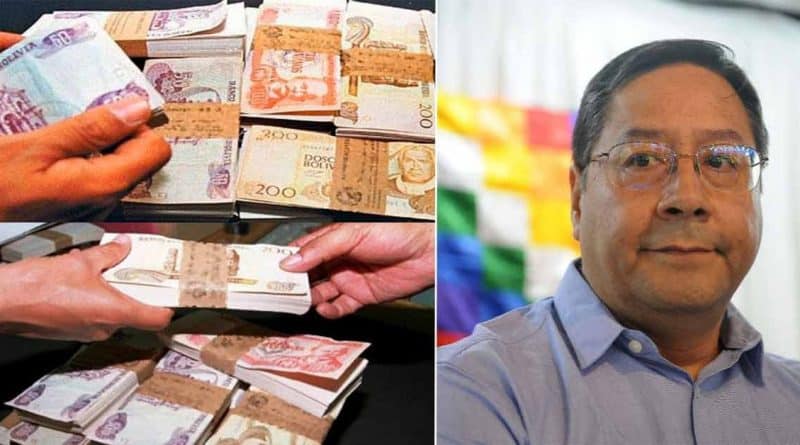
Bolivian currency notes (left) and Bolivian President Luis Arce (right). Photo: Kawsachun News.

Orinoco Tribune – News and opinion pieces about Venezuela and beyond
From Venezuela and made by Venezuelan Chavistas

Bolivian currency notes (left) and Bolivian President Luis Arce (right). Photo: Kawsachun News.
An increasing number of Argentinians are holding their savings in Bolivia’s currency, bolivianos, instead of the US dollar, according to a report from Bloomberg. Bolivia has the lowest inflation rate in the region and its stable currency results from a prudent monetary policy of the country’s socialist government, led by President Luis Arce.
Argentina’s annual inflation hit 50.9% in 2021 and the constant devaluation of its currency, the Argentine peso, has forced many Argentines to hold their savings in different forms, which in the past included US dollars, gold, and even cryptocurrencies. However, a recent law has restricted access to US dollars in Argentina, causing many living in the north of the country to acquire bolivianos which has maintained a stable value against the dollar for over a decade.
RELATED CONTENT: The Pink Tide Surges in Latin America
Bolivian Deputy Minister for Autonomies, Álvaro Ruiz, welcomed the news, saying, “In northern Argentina people don’t save in dollars or pesos, they save in bolivianos. We’re proud to have our own economic model designed by our President Luis Arce, with a strong currency, economic stability and certainty about the future. Bolivia is a strong and dignified country!”
Bolivia’s accumulated inflation for 2021 was just 0.51% according to an end-of-year report by the IMF. Kawsachun News spoke to economist Mike Gemio about how the government of Luis Arce has achieved this. Here is what he said:
The most important aspect here is the “Bolivianization” of the economy, that is to say, economic sovereignty. Especially over monetary policy. Some countries opt for Central Bank “independence” but in reality, the economic apparatus has to function along an agreed political line, and since 2006 with Evo Morales we’ve been able to do this with positive results. Economic sovereignty has given us the freedom to set interest rates and control the money supply to ensure there aren’t inflationary pressures being generated.
RELATED CONTENT: Bolivia’s Luis Arce Praises ‘Undeniable Advance’ of Latin American Left
Another important factor is food security. The state companies have played a key role here. For example, we have EMAPA which controls the prices of basic goods and stores supplies of things like grain and beef that can be released at strategic times to correct prices whenever there are supply-chain problems. The Ministry of Rural Development also plays a key role through technical support for farmers, subsidies, and helping farmers with transport and storage. All these are state policies aimed at ensuring that the price of basic foodstuffs doesn’t rise, and the statistics show that this has been successful.
The third factor is the nationalization of energy in Bolivia. Thanks to the nationalization of gas and the subsidies at the pump, we can ensure that fuel prices don’t rise. The opposition in Bolivia are opposed to this policy and want us to restore the free-market model that is leading to price rises right now in other countries.
(Kawsachun News)